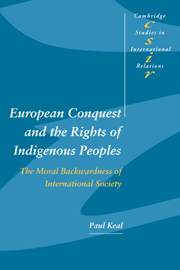 European Conquest and the Rights of Indigenous Peoples
European Conquest and the Rights of Indigenous Peoples Published online by Cambridge University Press: 03 December 2009
Over a period of 400 years following the conquest of Mexico there was a progressive retreat from conceding sovereign rights to particular non-European peoples. During this time international law had the major role of defining the normative foundations of the global society of states created by the expansion of Europe. It defined and codified the terms for membership in the society of states. It marked the boundaries between those who belonged to the society and those that did not. Those that did formed a moral community bound by mutually agreed rules of conduct. And fundamental to this community was the idea that its members were not obliged to treat non-members according to the norms that applied to relations between themselves. It was consequently a form of cultural imperialism that served to aid and to justify Europeans in subjugating non-Europeans and dispossessing them of their lands and other rights. International law can for these reasons, be seen as a ‘universalising discourse’ that simultaneously sought to include and exclude some but not all non-Europeans. It was universalising because the rules and norms it codified were intended to have universal application, but by setting the terms for inclusion in international society according to European standards it necessarily excluded many non-Europeans. From the vantage-point of the early twenty-first century it is easy to criticise international law for having been insensitive, even oblivious to other cultures and mores.
To save this book to your Kindle, first ensure [email protected] is added to your Approved Personal Document E-mail List under your Personal Document Settings on the Manage Your Content and Devices page of your Amazon account. Then enter the ‘name’ part of your Kindle email address below. Find out more about saving to your Kindle.
Note you can select to save to either the @free.kindle.com or @kindle.com variations. ‘@free.kindle.com’ emails are free but can only be saved to your device when it is connected to wi-fi. ‘@kindle.com’ emails can be delivered even when you are not connected to wi-fi, but note that service fees apply.
Find out more about the Kindle Personal Document Service.
To save content items to your account, please confirm that you agree to abide by our usage policies. If this is the first time you use this feature, you will be asked to authorise Cambridge Core to connect with your account. Find out more about saving content to Dropbox.
To save content items to your account, please confirm that you agree to abide by our usage policies. If this is the first time you use this feature, you will be asked to authorise Cambridge Core to connect with your account. Find out more about saving content to Google Drive.